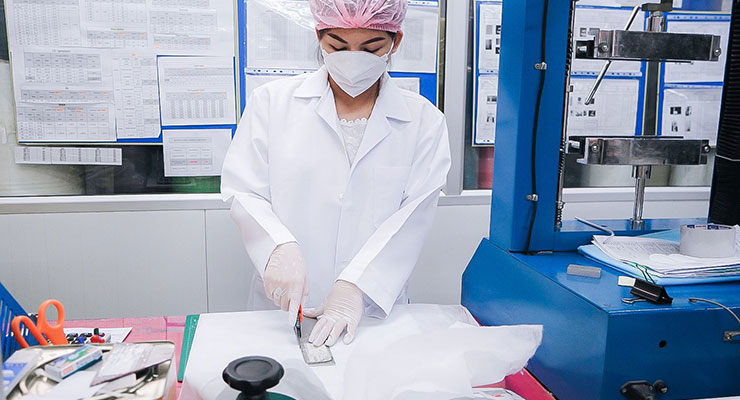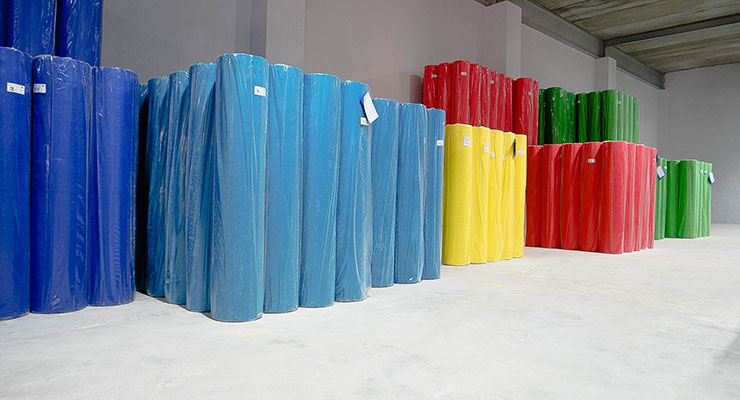08.01.23
55/5, Moo2, Phantainorasingh, Mueang, Samutsakhon
Thailand
+66-95-4643839
bdm@nnw.co.th
www.narula.co.th
Founded in 2008, Narula Nonwoven is one of Thailand’s leading manufacturers and suppliers of nonwoven materials. At the time of its founding, there were no other competitors in the region, making it an ideal time to enter the market, according to Yogesh Kumar, international business development head, Narula Nonwoven Co., Ltd.
Since its establishment, Narula has expanded quickly and now has a presence in more than 20 countries. Today, the company has five lines that can produce nonwovens in a range of widths as well as lamination, printing and slitting capabilities.
Due to its wide range of applications, Narula caters to various markets from medical and hygiene to the geotextiles and construction industries. Currently, Narula produces spunbond, spunmelt and meltblown fabrics in a range of widths and can also apply different finishes such as antistatic and fire retardancy.
Narula’s spunbond capacity is 23,500 MT/year. The fabrics can be produced in over 30 standard colors, as well as colors catered to the medical industry. They are available in a fabric weight range of 10-150 gsm.
Narula’s spunmelt capacity is currently 8,000 MT/year. Its spunmelt composite technology comprises the combination of spunbond (S) and meltblown (M) fabrics. This structure gives one or two layers of meltblown sandwiched in between two layers of spunbond. This results in the desired filtration quality along with physical properties gained through the spunbond fabrics including excellent tensile strength and durability. The SMS/SMMS/SSMMS fabrics also feature ultra-fine filtration properties as well as the fabric being hydrophobic which offers a good hydrohead barrier causing high demand in the hygiene and medical industry, among others.
Meanwhile, the company’s meltblown capacity is 3,000 MT/year. Meltblown fabrics are produced through the process of meltblowing in which PP polymers are extruded through small nozzles and are surrounded by high-speed blowing gas which causes the extruded fibers to be much finer than spunbond. The fibers blown through the nozzles are collected and form a meltblown sheet product that is desired for its filtration, sorbent and apparel properties. Meltblown’s filtration quality prevents the penetration of very fine particles and microorganisms including bacteria, thus catering to the medical and hygiene industries. Narula’s meltblown fabrics are produced to yield high Bacterial Filtration Efficiency (BFE) and the Particle Filtration Efficiency (PFE) results. Its materials are tested against ASTM F2101, ASTM F2299, EN 14683 and JIS B9908 standards or as required by customers.
Narula is committed to the research and development of products. Narula’s lab is well equipped which, combined with its skilled team, ensures that its manufacturing process from raw materials to rolled goods are consistently meeting the highest standards. Finished goods are quality inspected before they are sent to customers. Once they pass quality control, rolls are stamped with Narula’s standard assurance certification.
Narula can test to ISO, Oeko-Tex, RoHs and REACH standards. Additionally, it conducts tests for tensile strength, elongation, thickness, flame retardancy, UV resistance, hydrostatic head, air permeability, water absorbency, biodegradability, anti-bacterial and anti-static upon a customer’s request.
“The nonwovens industry has potential, and it is growing annually at a CAGR of 7%,” says Kumar. “It will remain forever with or without the effect of Covid. People have realized the importance of living a healthy life.”
Thailand
+66-95-4643839
bdm@nnw.co.th
www.narula.co.th
Founded in 2008, Narula Nonwoven is one of Thailand’s leading manufacturers and suppliers of nonwoven materials. At the time of its founding, there were no other competitors in the region, making it an ideal time to enter the market, according to Yogesh Kumar, international business development head, Narula Nonwoven Co., Ltd.
Since its establishment, Narula has expanded quickly and now has a presence in more than 20 countries. Today, the company has five lines that can produce nonwovens in a range of widths as well as lamination, printing and slitting capabilities.
Due to its wide range of applications, Narula caters to various markets from medical and hygiene to the geotextiles and construction industries. Currently, Narula produces spunbond, spunmelt and meltblown fabrics in a range of widths and can also apply different finishes such as antistatic and fire retardancy.
Narula’s spunbond capacity is 23,500 MT/year. The fabrics can be produced in over 30 standard colors, as well as colors catered to the medical industry. They are available in a fabric weight range of 10-150 gsm.
Narula’s spunmelt capacity is currently 8,000 MT/year. Its spunmelt composite technology comprises the combination of spunbond (S) and meltblown (M) fabrics. This structure gives one or two layers of meltblown sandwiched in between two layers of spunbond. This results in the desired filtration quality along with physical properties gained through the spunbond fabrics including excellent tensile strength and durability. The SMS/SMMS/SSMMS fabrics also feature ultra-fine filtration properties as well as the fabric being hydrophobic which offers a good hydrohead barrier causing high demand in the hygiene and medical industry, among others.
Meanwhile, the company’s meltblown capacity is 3,000 MT/year. Meltblown fabrics are produced through the process of meltblowing in which PP polymers are extruded through small nozzles and are surrounded by high-speed blowing gas which causes the extruded fibers to be much finer than spunbond. The fibers blown through the nozzles are collected and form a meltblown sheet product that is desired for its filtration, sorbent and apparel properties. Meltblown’s filtration quality prevents the penetration of very fine particles and microorganisms including bacteria, thus catering to the medical and hygiene industries. Narula’s meltblown fabrics are produced to yield high Bacterial Filtration Efficiency (BFE) and the Particle Filtration Efficiency (PFE) results. Its materials are tested against ASTM F2101, ASTM F2299, EN 14683 and JIS B9908 standards or as required by customers.
Narula is committed to the research and development of products. Narula’s lab is well equipped which, combined with its skilled team, ensures that its manufacturing process from raw materials to rolled goods are consistently meeting the highest standards. Finished goods are quality inspected before they are sent to customers. Once they pass quality control, rolls are stamped with Narula’s standard assurance certification.
Narula can test to ISO, Oeko-Tex, RoHs and REACH standards. Additionally, it conducts tests for tensile strength, elongation, thickness, flame retardancy, UV resistance, hydrostatic head, air permeability, water absorbency, biodegradability, anti-bacterial and anti-static upon a customer’s request.
“The nonwovens industry has potential, and it is growing annually at a CAGR of 7%,” says Kumar. “It will remain forever with or without the effect of Covid. People have realized the importance of living a healthy life.”




